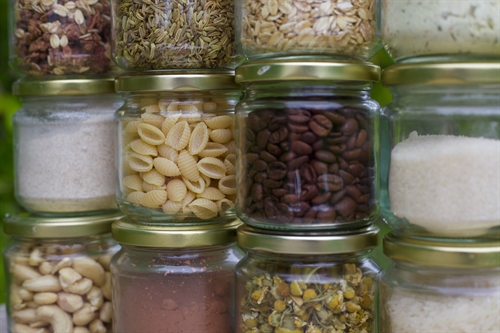A food cupboard stocked with staple dry goods – like grains, pulses, flour and spices – and with a few tins will help you produce tasty, healthy meals in minutes. Dried and tinned goods are often cheaper than their fresh or ready-prepared counterparts; and just as tasty. But pantry goods can also contribute to domestic food waste if they languish in the dark corners of your food cupboards.
Audit your larder
Doing a stock check and overhaul of your food cupboard will help you to weed out packets, boxes and tins that may be past their best, or that need eating in the next few days or weeks. Make a meal plan that takes in these ingredients, or make a plan to dispose of them and their packaging responsibly.
Can I donate unwanted food to charity?
Many food banks and community fridges can make use of food that is close to its use-by date. But it’s not helpful to burden them with food that may not be safe to eat. They will have to dispose of it, which may cost them. If you’re not sure about an item, enquire, as some organisations are set up to take expired food. Some schools and nurseries may take expired dry goods for sensory play or crafts – but always ask first.
How to organise your food cupboard
Once you know what you’ve got, clean the shelves and put everything that you’re keeping back in the cupboard. Organising your food cupboard by category (for example, pulses, snacks, baking ingredients, tinned fruit…) will let you see at a glance what you’ve got.
Rather than buying a dedicated pantry organisation system right away, in the first instance, use trays, baskets and boxes that you already have around the house. After a few weeks, you’ll have a better idea of what you want from your pantry system, and you’ll be in a better position to buy the gadgets and containers that work best for you.
Get the larder stock-check habit
Check your larder before you go shopping and while you are meal planning. This will help you to avoid buying food that you already have; and it will also help you avoid those annoying situations where you get halfway through a recipe and find you don’t have enough of a crucial ingredient. As you check your larder, give it a quick tidy. This habit will help you keep on top of your food stocks, and it will make it easier to find everything in your pantry.
Hungry for more tips to reduce your food waste? Consumer guide Which? has 10 easy ways to reduce food waste at home.
Can I store food in a self-storage unit?
Many storage companies prohibit food in bags and packets to avoid a pest problem. A storage company is more likely to allow sealed tins and bottles – but it’s usually on a case-by-case basis. It’s best to check at reception before storing any kind of perishable goods in your storage unit. And check with your self-storage insurance provider to make sure all your stored goods are covered by your insurance policy, too. If you’ve got any questions about what is covered by your Store and Insure policy, contact us.




